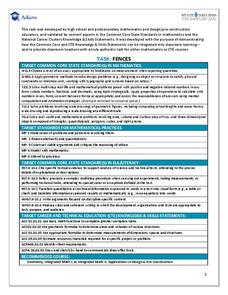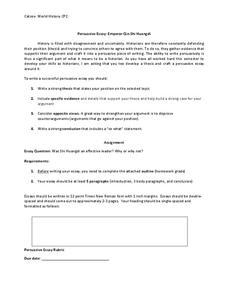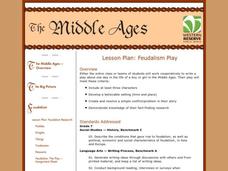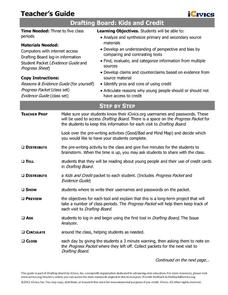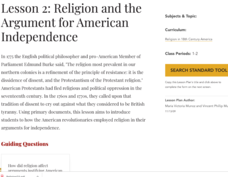National Endowment for the Humanities
Lesson 4 James Madison: Internal Improvements Balancing Act—Federal/State and Executive/Legislative
Who has the power? The founding fathers asked the same question when the United States was formed. Learners explore issues that arose during Madison’s presidency that raised constitutional questions. Through discovery, discussion, and...
Henry Ford Museum
Sustainability: Environmental Management and Responsible Manufacturing
When you think about environmental sustainability, the Ford Motor Company probably isn't the first company to come to mind. A four-lesson unit introduces learners to the idea of sustainability and environmental stewardship. It describes...
Library of Congress
Thomas Jefferson's Library: Making the Case for a National Library
The United States Library of Congress, the largest library in the world. But such was not always the case. The library was destroyed during the War of 1812. In a persuasive letter to Samuel H. Smith, Thomas Jefferson offered to sell his...
PBS
Evolution of the Presidency: Theodore Roosevelt to Franklin D. Roosevelt
How much power should a president be allowed to exert? Theodore Roosevelt and Franklin D. Roosevelt exercised their power according to their interpretations of the United States Constitution, and these interpretations affected the...
Achieve
Fences
Pupils design a fence for a backyard pool. Scholars develop a fence design based on given constraints, determine the amount of material they need, and calculate the cost of the project.
Achieve
Spread of Disease
Viruses can spread like wildfire, and mathematics can model the speed of infection. Given a function, scholars analyze it to describe the spread of a disease within a stadium. Learners find the initial number infected and the maximum...
Curated OER
Persuasive Essay
Next time you assign your young historians to write a persuasive essay, use this document as a starting point and support them with a rubric, tips for writing a successful persuasive piece, and a general essay outline.
Federal Reserve Bank
Savvy Savers
What are the benefits and risks of saving in an interest-bearing account? Pupils explore concepts like risk-reward relationship and the rule of 72, as well as practice calculating compound interest, developing important personal finance...
Northeastern Educational Television of Ohio, Inc.
Feudalism Play
Using research notes on feudal roles in medieval Europe, learners work cooperatively to write a play about one day in the life of a boy or girl in the Middle Ages.
City University of New York
Dutch New York
What patterns appear in the treatment of Jewish and Quaker immigrations to New Netherland? Your class members will work together to read and discuss the religious restrictions placed on immigrants to Dutch New York.
iCivics
Drafting Board: Community Service
Should schools impose community service graduation requirements? In the final lesson of the Drafting Board series, learners solidify their practice of crafting an argument supported by sound reason and evidence.
iCivics
Drafting Board: Electoral College
Should the president of the United States be voted by the Electoral College or the popular vote? Your young historians will consider the pros and cons of the Electoral College, and make an argument using reasons and evidence provided in...
iCivics
Drafting Board: Kids and Credit
Should kids under the age of 18 be given access to credit cards? Learners identify pros and cons of using credit, develop claims based on evidence, and finally argue reasons for or against credit for minors.
iCivics
Drafting Board: Military Intervention
Should countries use their militaries to stop humanitarian crises in other countries? Learners make claims, organize their reasoning, and provide evidence for their arguments with this rich resource.
iCivics
Drafting Board: Interest Groups
Does the influence of interest groups harm a political system? Your class members will analyze the role of interest groups in American politics, as well as consider the effect of perspective, bias, loyalty, and the First Amendment.
Speak Truth to Power
Jamie Nabozny: Bullying: Language, Literature and Life
Class members identify bullying in contemporary texts and role play how they might change those scenes to examples of anti-bullying. They then re-define their initial definitions of bullying and discuss what they would like to see as...
iCivics
Limiting Government
While this instructional activity includes several nice worksheets to identify and discuss the various limits on government (i.e. a constitution, the rule of law, separation of powers, consent of the governed, etc.), its main value lies...
Loudoun County Public Schools
World War I Causes Project
After completing this detailed and well-designed project, your young historians will be well-versed in their explanations of the reasons that various countries joined World War I! Learners design a picture book covering seven primary...
American Documentary
Religion in Culture & Politics: Women’s empowerment in Syria
What defines a woman as empowered, and how does this definition compare to the ideas and actions of a group of Muslim women in Syria? After watching a series of video clips from a documentary film about a school for girls in Damascus,...
Houghton Mifflin Harcourt
Renaissance and Reformation Writing for the SAT
Responding to a question on the Machiavellian principle of a ruler's need for power and ruthlessness, young historians are given writing tips and a framework for constructing a well-developed essay in 25 minutes. The given structure of...
National Endowment for the Humanities
Lesson 2: Religion and the Argument for American Independence
Young scholars examine how religion affected arguments justifying American independence. They read and analyze primary source documents, and write an essay analyzing how Americans used religious arguments to justify revolution against a...
National Endowment for the Humanities
Lesson 1: The First Great Awakening
High schoolers examine the First Great Awakening and how it affected religious belief in colonial America. They read and analyze primary source documents, explore various websites, and write a five-paragraph essay examining the beliefs...
Curated OER
Centers of the Storm: The Lyceum and the Circle at the University of Mississippi
Greek Revival architecture and the Civil Rights Movement? Sure! Examine how the Lyceum and Circle, two historic buildings located on the campus of the University of Mississippi, relate to integration and the 1962 riot on the university...
National Endowment for the Humanities
The Debate in the United States over the League of Nations: Five Camps: From Voices of Consent to Voices of Dissent
Learners explore and discuss Woodrow Wilson's concepts for peace and the League of Nations. They understand efforts made to foster American support for the League and discuss the opposition shown in the Senate.






